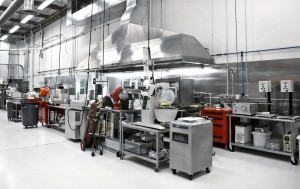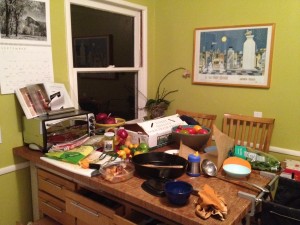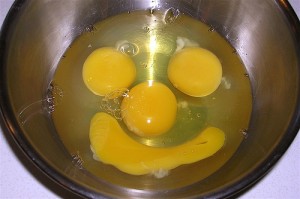The other day I was sitting in the bathroom, lamenting the decline of my bathroom reading material. At its zenith, the back of my toilet was heavy with Nature. (I inadvertently impressed one of my grad school classmates, who didn’t know that I thought I was subscribing to a magazine with lots of photos of penguins and manatees.)
Now the can is crammed with lighter reading: fashion magazines left behind by traveling visitors, Highlights, and the cooking magazines we’ve been getting as gift subscriptions.
So the truth is, I’ve been turning my nose up at the reading material. (Insert your choice of bathroom humor here.) But then I picked up an issue of Cook’s Illustrated and remembered how much I liked it—and then realized it’s not as featherweight as I thought.
If you haven’t read it, here’s a bit of a description. There are notes from the readers with questions about cooking, and tips with different creative, low-tech techniques. The bulk of the magazine is recipes, and at the end are comparison tests of kitchen equipment.

But what I like about it is that it’s so methodical, step-by-step–dare I say, scientific? An article about 10-minute oatmeal in a recent issue aimed to get oatmeal to the perfect porridge–quickly. The author embarks on her experiment, outlines her steps. She soaks one batch of grains overnight, comparing it to a control oatmeal cooked straight from the package. She tinkers until she finds just the right combination of heat and time.
The magazine also includes interesting things about the science of cooking in the process of providing recipes. A recent recipe for Mediterranean braised green beans talked about how the pectin in bean pods breaks down in cooking—if something acidic is added, like tomatoes, it takes them longer to cook.
Apparently there is a related cooking show, which I’ve never seen. So, in my imagination, the test kitchen looks like some of the labs I’ve peered into—long benches filled with people at work, with interesting-looking instruments, wild thin-walled glassware, goggles, thermometers.
Combining science and cooking has been the calling-card of some of the world’s hippest restaurants and most sought-after chefs, who use things like liquid nitrogen, water baths, pressure cookers, and precise calculations of an oven’s sweet spot. (A six-volume, 2,400 page book, Modernist Cuisine: The Art and Science of Cooking, came out last year—the encyclopedia of cutting-edge cookery).
But I think there’s also plenty of science to be learned even if you don’t have a -320 degree Fahrenheit fluid in your pantry.
In On Food And Cooking: The Science and Lore of the Kitchen, Harold McGee talks about the simple magic of the egg, with its yolk and white filled with protein molecules free-styling in liquid. When the egg is heated, the proteins bond, becoming a moist solid—but if it’s heated too much, the proteins get too cozy, leaving no room for water to get in (think rubbery scramble).

A kitchen, even a modest one, can be fertile ground for experimentation, particularly when there are people in it, testing, trying, tasting, talking. And I have a feeling some of the people who think they’re not so great at science, or are distrustful of some of the stories they see and read, are damn good cooks. People who don’t have to look up what makes a perfect scrambled egg.
I really wanted to end there, because it has a nice ring to it. But maybe I’ll go a step farther today. How can we value cooking more, and use it as a door into other kinds of science? I don’t know the answer, but maybe you and me and people we know can go into the kitchen and stir some things up.
**
Images
Top: mcwetboy via Flickr Middle: Ryan Matthew Smith/Modernist Cuisine, LLC Bottom: Too embarrassed by state of kitchen to credit

I love Cooks Illustrated! I have one of their cookbooks, which I refer to all the time. They don’t just tell you what to do, they tell you WHY.
A few nights ago I found a helpful hint: putting a little olive oil on your cheese grater makes it much, much easier to grate mozzarella. It also prevents shredding your knuckles. Thanks CI.
Nice thoughts Cameron. Though I eventually had to admit I wasn’t great at the lab bench, I do still like experimenting in the kitchen. There’s a lot less pressure and fear of explosions.
And don’t worry, before I started writing, I thought Audubon was a magazine about German driving 😉
To your ending question: sciencefare.org. Your elegant post is basically a summary of the exact reason we started up ScienceFare, a blog about scientists doing experiments to develop new recipes and test ides in the kitchen. We try to do exactly what you said- make cooking a gateway into science.
Kevin
PS- I LOVE Cook’s Illustrated, and basically try to write my posts like their articles.